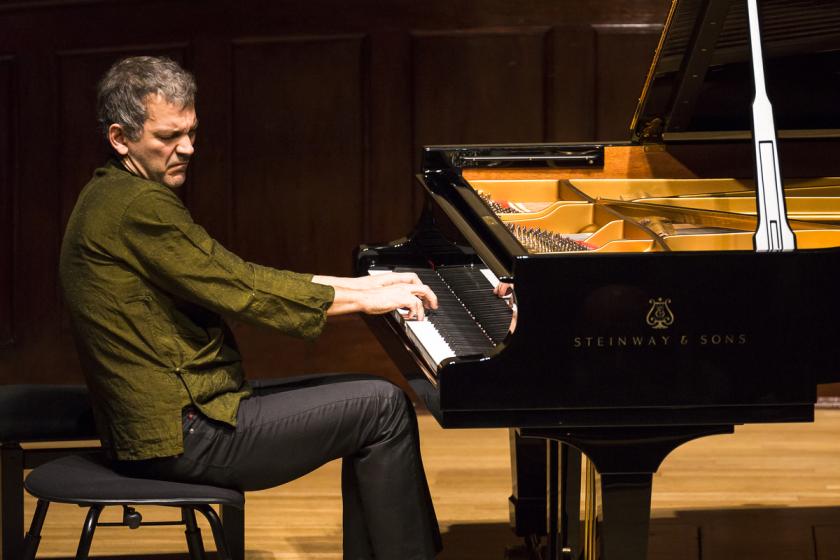Contemporary jazz is a world full of magpies – artists who flit between genres and build glittering nests of disparate musical influences. Rock up to a so-called jazz night today and the repertoire can come from anywhere, you’re as likely to hear Jimi Hendrix or J. Dilla as Jerome Kern, and pianist Brad Mehldau has played a role in making that happen.
Over the course of the past twenty years, Mehldau has established himself as one of the most distinctive and influential pianists of his generation, a musician with a healthy lack of respect for musical boundaries. Cast an eye over the tracklist of 10 Years Solo Live, a four disc compilation of his work released this year, and you’ll spot “contemporary standards” by the likes of Lennon and McCartney and music by Brahms alongside traditional jazz repertoire – and the pianist’s two sets at Wigmore Hall were just as wide-ranging.
'Flop-Eared Mule' was an intricate courtship of melody lines that twisted, turned and tied each other in knots
Thursday night brought a series of preludes and fugues from Bach’s The Well-tempered Clavier, interspersed with related improvisations and the UK premiere of the pianist's own "Three Pieces After Bach", a recent commission. It made for a beguilingly beautiful set in which Bach’s melodies flickered in and out of focus, emerging from pulsing vamps, fluttering chords, and knotty counterpoint, as dense and intractable as bindweed, before wriggling free or melting away like memories. There were Messiaenic glimmers in the harmony, flashes of EDM-inspired minimalism and great washes of sound, darkly luminous, like sheets of black ice.
Mehldau’s touch was sublime throughout. He thought about the weighting of every phrase and it imbued the music with the kind of subtle detail you rarely hear in a jazz piano gig. Though his three pieces raced back and forth across the years, all the way from 1720 to 2017, they never felt hurried and were never less than engrossing.
Friday night’s “programme of improvised jazz” was less of a revelation. In the latter half of the set the pianist gravitated towards drawn-out, strobing chord melodies, which wore thin after a while. But there were plenty of highlights in the early stages. A swooning rendition of “When I Fall In Love” was lifted by wonderfully subtle harmonic shading; a swirling, minimalistic original with depressive tendencies was painterly in its rendering; and a folksy ditty called “Flop-Eared Mule” was as frighteningly contrapuntal as anything from night one, an intricate courtship of melody-lines that twisted, turned and tied each other in knots.
At the close, with half the audience still on their feet, Mehldau became the first jazz musician to receive the prestigious Wigmore Medal, in recognition of his adventurous, boundary-breaking career. His response? Encores “And I Love Her” and a bluesy, helter skelter take on “Greensleeves”. Neither was as transcendent as his "Three Pieces After Bach" but they were as eclectic and playfully genre-fluid as anything you could wish for.















Add comment